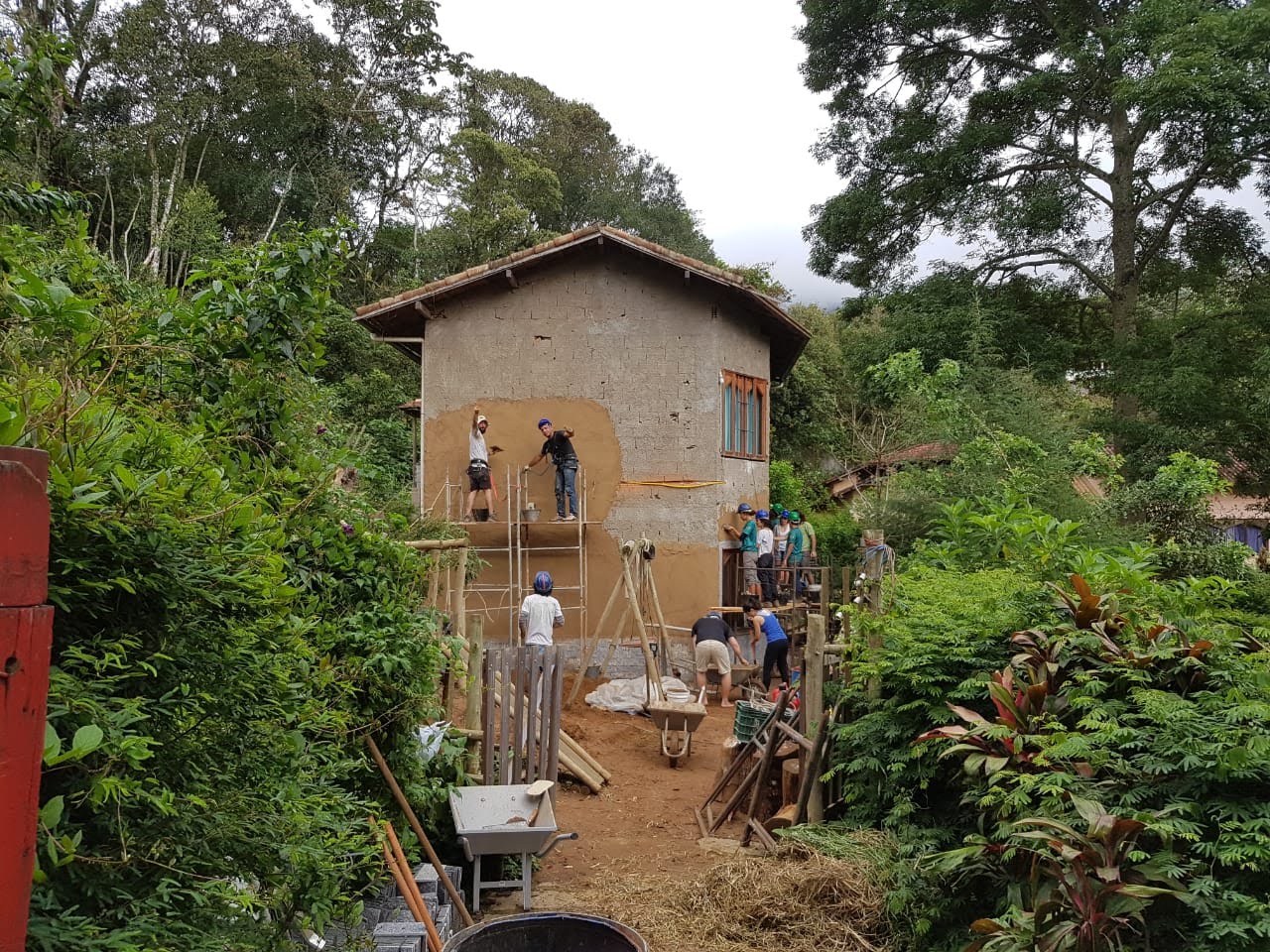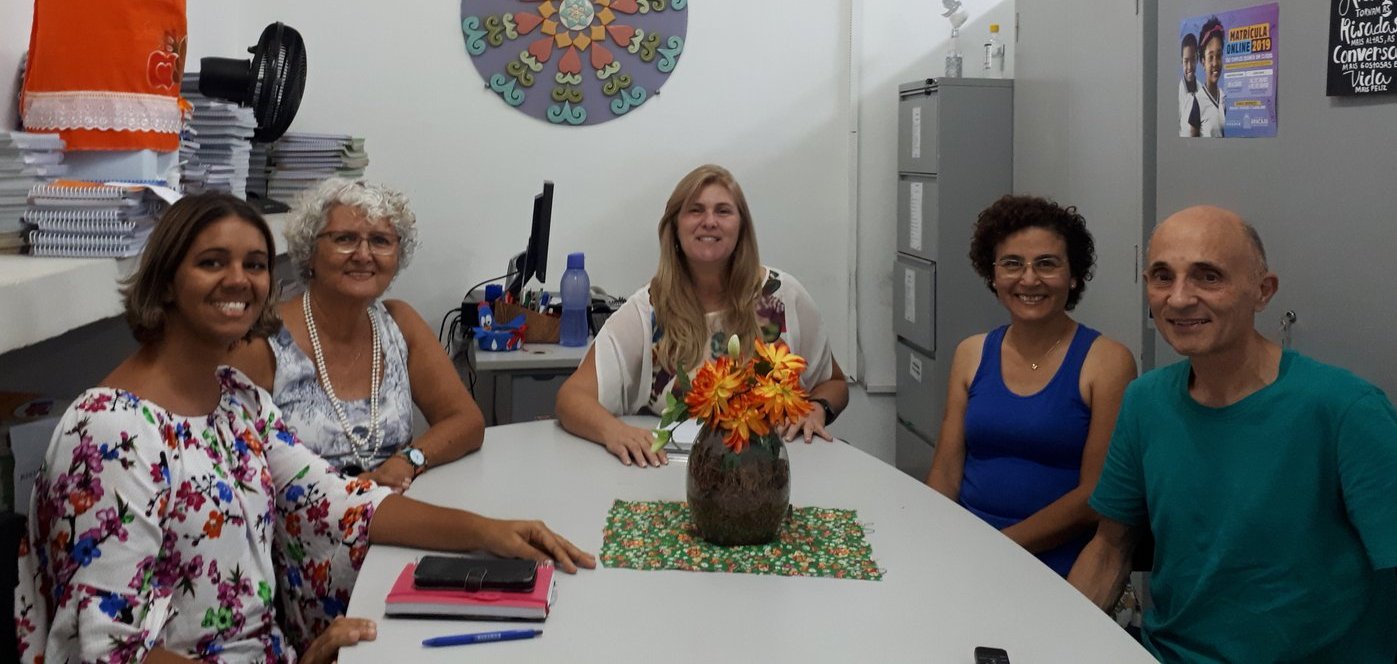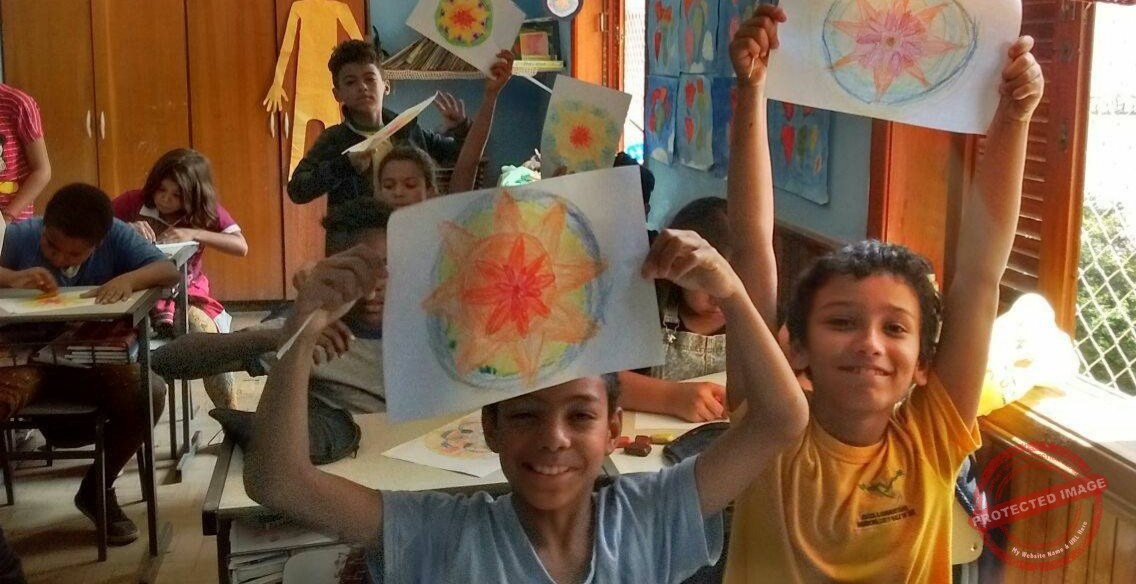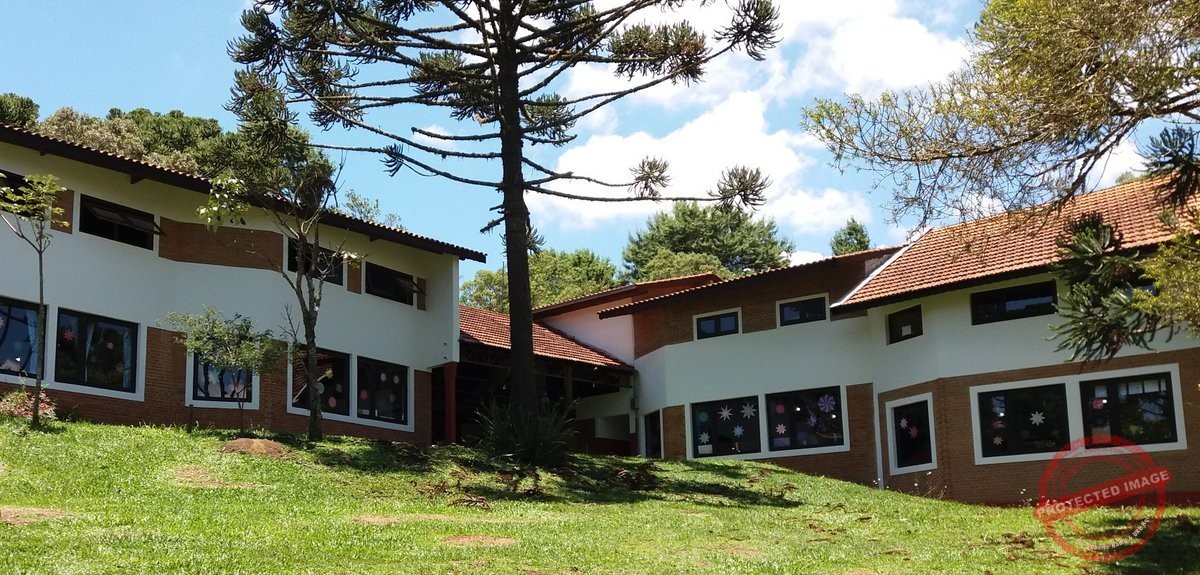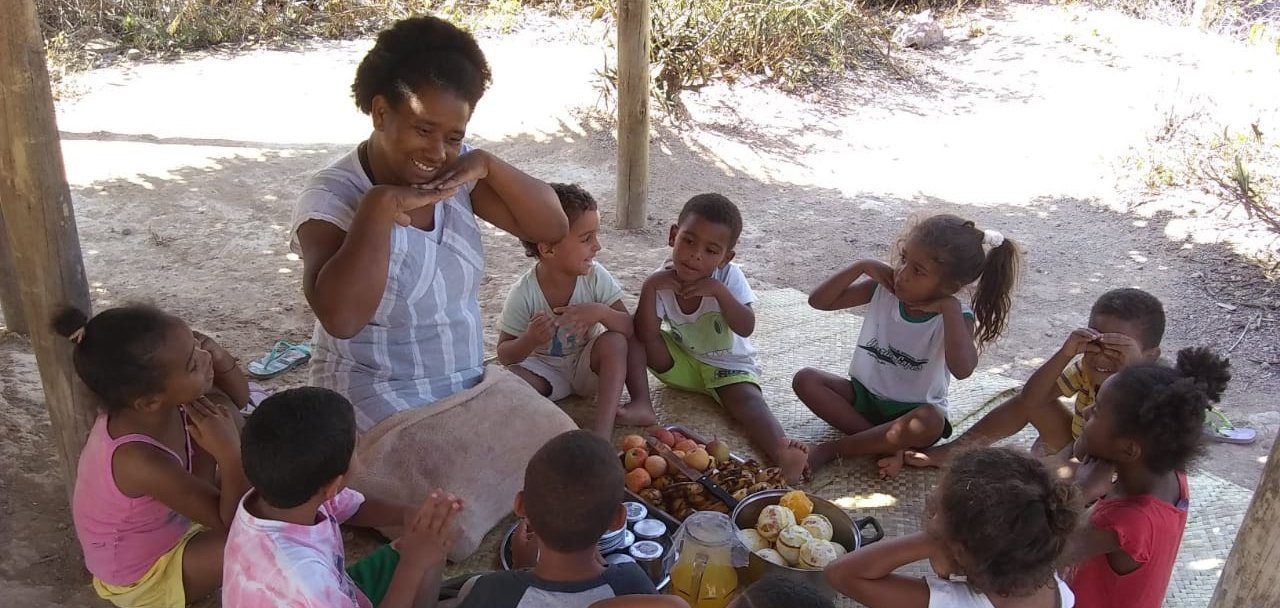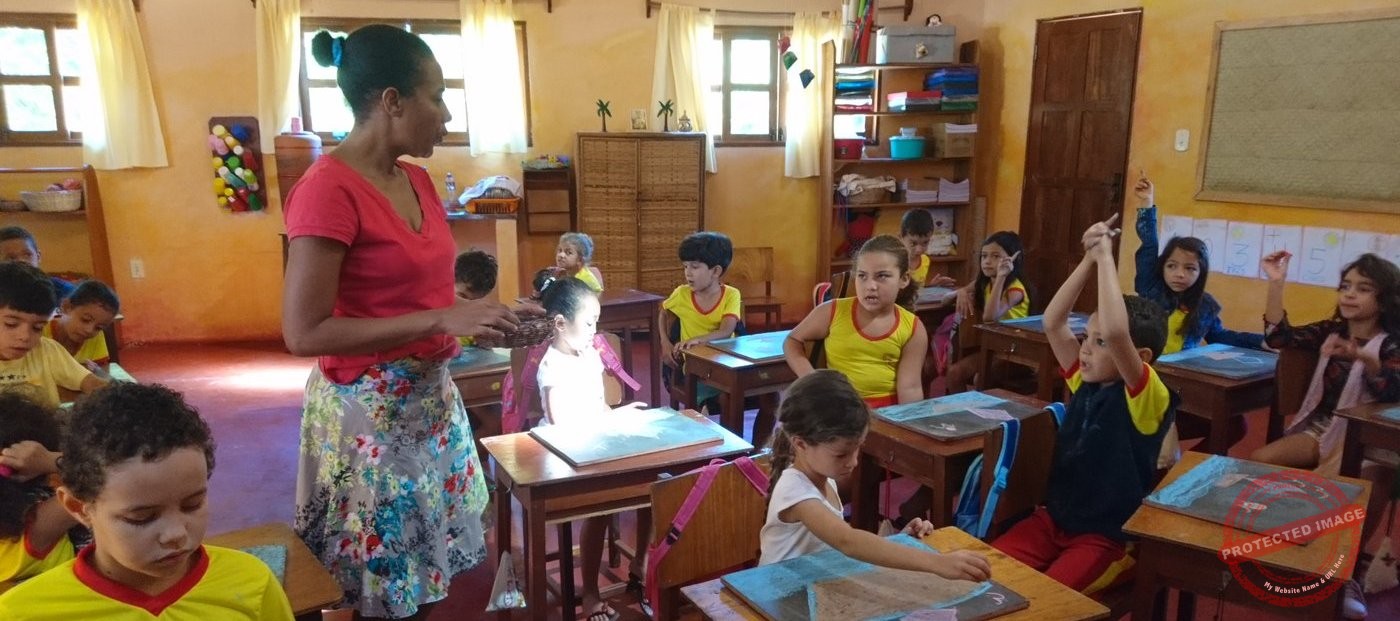[print-me target="body"]
The Waldorf Pedagogy
in public school
history – challenges – perspectives
by Rubens Salles and Rosineia Fonseca
Nova Friburgo RJ
On April 16, 2019, we visited the Cecília Meireles Municipal School in Nova Friburgo and talked with 9 school representatives, members of the APCM – Cecília Meireles Pedagogical Association, all with other functions as well.
highlights
1 – As we have already seen in the case of the Municipal Community School of Vale de Luz, the Cecília Meireles School also faces difficulties in hiring teachers specialized in Waldorf Pedagogy, for the training and updating of its teachers, to manage the lack of adequate materials and teachers of subjects that the city does not provide (such as manual work, music, eurythmy, etc.), but the school has a very dedicated team to face and overcome these adversities in a very positive and inspiring way.
2 – Importance of the organization – Attention was drawn to the dedication of the management group, which is organized to meet all the demands arising from the management of the school, with the participation of mothers and teachers in this work, assuming the various functions necessary in the Pedagogical Association Cecília Meireles, in the School Council , in the Association of Parents and Employees and in the management of the school.
3 – Community engagement – We also saw how important it is for the school to have a community of parents engaged in fighting with the city hall for the improvements they want in the school. In addition to benefiting the school, this attitude also ends up benefiting the rest of the public network. As it is located in an upscale neighborhood, Escola Cecília Meireles has a greater number of parents who are familiar with Waldorf Pedagogy, or who have even moved to the region because of the school, which helps to strengthen it.
4 – Taking advantage of the teachers' skills – As the municipality does not provide teachers for some subjects specific to a Waldorf school, they try to take advantage of the skills of the available teachers. Thus, the history teacher, who also has experience in woodworking, teaches woodworking and the science teacher, who has a master's degree in botany, teaches gardening.
5 – Waldorf Pedagogy needs to be better known – This lack of knowledge is notorious among public school educators in general, as this pedagogy is not studied in higher education courses. Thus, sometimes teachers with public examinations choose to go to a Waldorf school with no idea what it is about. And with each change of municipal government, an even bigger problem is generated, as the team of Waldorf schools that have an agreement always have to explain to new managers about pedagogy and show all the work they have already done, and fight for the renewal of the agreement.
Some basic data of the municipality of Nova Friburgo
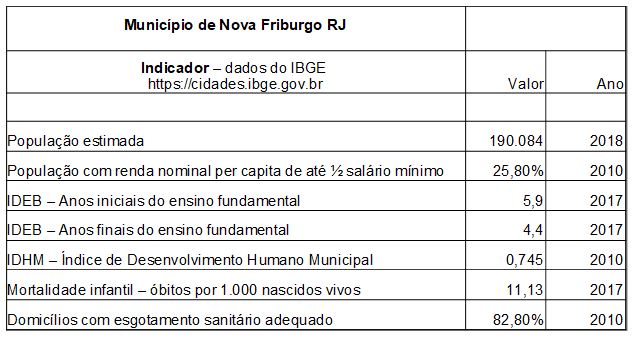
People interviewed
Talita Melone – 6th grade teacher, president of APCM, member of the School Board and the Parents and Staff Association
Mirtes Garuba – 1st year teacher and president of the School Council
Angelita Machado – mother of a student and member of the Association of Parents and Employees
Jackeline Rocha – student's mother and counselor on the School Board, representing parents
Natasha Kieds – student mother and member of the Parent Staff Association and Parent Council
Gabriela Cordoeira – 3rd grade teacher in the morning and Kindergarten in the afternoon, member of the Steering Group
Fabiane Moura – student's mother, 4th grade teacher, vice president of APCM, member of the School Council and the Association of Parents and Employees
Rosali Rodrigues – deputy director
Karine Guimarães – 2nd year teacher
Address – Rua Tohoru Kassuga 218, Cascatinha – Nova Friburgo RJ – CEP 28621-360
[email protected] – Phone: (22) 2528-3192
Facebook
It has classes from kindergarten II to eighth grade, one of each and 3 preschool classes, serving 253 full-time students in 2019. Each class has two teachers, one teacher in the morning and the other in the afternoon. Students receive four meals.
meet the Pedagogical project – pdf
According to Mara Rúbia's report, the Cecília Meireles Municipal School originated from the interest of a group of anthroposophists, parents and educators, who created the Nascente Pedagogical Association, and the first classroom was the garage of Lúcia Casoy's house, in 1988. After the first 6 months of activity, the Gorsky couple offered a house that housed the initiative with more space. The group worked intensely to maintain the project, holding study meetings, seeking resources and promoting bazaars, lectures, exhibitions and other events, and the association received an inheritance from Maria Hegerkamp, with which the land where the headquarters of the school.
In 1999, the land belonging to Associação Pedagógica Nascente was donated to Associação Criança do Vale de Luz, so that Escola Nascente could become public. This is then called Escola Municipal Cecília Meireles, and starts in the year 2000 as a day care center, serving full time and starts to offer Elementary Education from 2003, already in agreement with the Municipality of Nova Friburgo. During this period, the association had a construction project approved by the Software AG Foundation, from Germany, which donated the value for the construction of the building that today houses all the kindergarten, the secretariat, service room, kitchen and the school's inner courtyard.
The Cecília Meireles Pedagogical Association was recently created, made up of members of the school community and employees, with the aim of supporting and ensuring the practice of Waldorf Pedagogy within the Cecília Meireles Municipal Waldorf School. Through an agreement with the Municipality of Nova Friburgo, which is responsible for maintaining the staff, food and basic materials inherent to each and every municipal public school. However, there are materials inherent to Waldorf Pedagogy that the city does not provide, as well as teachers for subjects such as music, woodworking, crafts, eurythmy, etc. Seeking resources to meet these pedagogical demands is one of the association's objectives.
Relations with the Department of Education
The agreement that Cecília Meireles School has with the city hall, through the Pedagogical Association of Vale de Luz, needs to be renewed periodically, and this is always a moment of tension. With each new municipal administration, the school needs to introduce itself again to the new managers, explain what Waldorf Pedagogy is, tell all its history, and wait for the agreement to be renewed again.
Municipal bylaws for education – pdf
A very important demand that the school team has is that Waldorf Pedagogy becomes better known in the academic environment and in the education departments, since the vast majority of Pedagogy graduates, as well as teachers with a degree, do not know it, and not even those who work in the management of public education.
the school audience
The school is located in an upscale neighborhood of the city and receives students from families that live in this region, children of liberal professionals, lawyers, doctors, dentists, civil servants and also children of people who work in the neighborhood, such as gardeners, maids and janitors. . Most classes are at their limit of students, which is 25, except for Grade 8, which has 12 students. According to Talita Melone, the school attracts new residents to the neighborhood and also receives students from other districts of Nova Friburgo. There are even families from other cities who move to Nova Friburgo in search not only of quality of life, but also of Waldorf Pedagogy in public schools. “So, for us, this is already an indication of a broad recognition of the work that we have been doing for about eighteen years as a public school”.
Part of the families choose to enroll their children in this school because it is public and full-time, which is a differential in relation to other schools in the region, others because it is a Waldorf school. There is a group of parents who help more directly with the demands of the school, participate in the Association and the Council of Parents, and even in joint efforts to maintain the property, and another larger group that collaborates on the occasion of school parties.
Talita also told us that there was decisive support from parents in conjunction with teachers so that the school could implement the second segment of elementary education, from the 6th to the 8th grade, and they also had the support of teachers from other public schools - who also they are school parents – university professors from the city and businessmen, in recognition of the school's work.
The participation of parents
Escola Cecília Meireles has many students who are children of parents who could even keep them in a private school, which makes the school's clientele different from other public schools in the municipality. These parents tend to be more participatory and even more aware of their rights and of what a public school should provide for students. Several teachers and staff also have their children at school.
Talita – The school has a lot of parental involvement. Parents go a lot to the municipal education department, picket, go to the door, make a petition, while the teacher doesn't arrive, while the lunch box doesn't arrive. They question the quality of the food that comes, they want the best for their children. They are very active parents. They don't want a high school. They want a good school for their children.
If all schools had participating parents like this, education in Brazil would certainly be of much better quality.
To provide parents with greater knowledge about Waldorf Pedagogy, the Cecília Meireles Pedagogical Association promotes bimonthly seminars lasting one and a half days each meeting. It is the Paidagogical project. This year this project is being funded by the Mahle Institute. Parent participation is important in fundraising for the school by organizing events such as parties and dinners, and there are a good number of parents working both pre-event, during and post-event, which greatly helps teachers.
There is a manual work group at the school that meets every Thursday from eight to noon. Already had patchwork, Waldorf doll. They are currently working on dry felting with Natali, who is a school mom. Another mother helps with the crochet. Rosali, assistant director, has already made a baby star doll with the group and started crocheting. Mirtes was also part of this work with the group. The jobs depend on the season. Each year the group is modeled, taking advantage of the skills of each one.
There is also the group of “Parents transforming the School”. This was the group of parents who made the ecological plaster on one of the school's buildings. Everything was organized by them. It's a group that makes small repairs to the school when it can be done. Weeded an area, repaired the classroom. Before classes begin, several groups of parents paint, tidy, clean and deliver the classroom ready to the teacher. The structural part, the school's assets, does not belong to the municipality, it belongs to the Association, but when requested, the municipality sends materials for maintenance.
It is clear to see that the concept of community public school is being successfully implemented at Escola Municipal Cecília Meireles. Here, most parents really take the school as their own.
The hiring of teachers
The Cecília Meireles School, like the one in Vale de Luz, also faces difficulties when it needs a new teacher, as there is no specific competition in the municipality to hire a Waldorf teacher. Thus, it happens that the school receives teachers who do not know the pedagogy. There are cases in which this teacher rediscovers himself by getting to know the school, tries to learn from his colleagues, begins to study and ends up integrating very well, but there are also cases in which this does not happen and harms the work. In November 2018, a letter was issued asking the Department of Education to hold a specific public contest for schools that offer differentiated pedagogies, such as Waldorf Pedagogy. See attached:
Office Secretary of Education – pdf
Today, all of its regular education teachers have a public examination, but many still lack training in Waldorf Pedagogy. This is one of the great challenges for the school.
Talita – We have teachers who arrived here knowing that they were coming to a Waldorf school and that they would need to learn this new language. We have teachers who are very close to pedagogical practice, even because it is a daily necessity, but they do not come close to the premises of Waldorf pedagogy and anthroposophy itself. And we have teachers who resist, take a long time, and even leave school because they don't fit in. It always existed.
To serve the second segment of elementary education, there was a partnership with the Government. The current Secretary of Education understood the importance of the class teacher who accompanied the class until the 5th grade could continue until the 8th grade. This type of teacher does not exist in the public network from the 6th year onwards, only subject teachers. It was agreed that the class teachers, who had training, a degree and wanted to continue with their class, would teach the period classes in partnership with the subject teachers. It would not make sense, being a Waldorf school, that classes from the 6th grade onwards were taught only by subject teachers without the tutoring relationship that the class teacher has with his students and the interdisciplinarity inherent to a class at the Waldorf school.
Talita – We keep the figure of the class teacher, who accompanies the class every day and the subject teacher sent by the city hall teaches together with this class teacher when he is here. It's a joint plan. For example, I am now in a period of History. We have a history teacher at school. I conduct the planning on days when he is not. I teach the classes. On the day he is, I lead the soulful Waldorf part of the class. The rhythmic part is what I do, because I am the Waldorf teacher, the soul story is what I tell, the drawing, in short, the doing part of the class is planned together with this teacher and he, then, inserts himself into the season planning. I joke that it's teaching four hands. Don't have a four-handed piano? We are learning to teach four-handed classes here. And it has very interesting experiences.
In order to best fulfill the Waldorf curriculum, the school seeks to leverage the skills of available teachers. Thus, the history teacher, who also has experience in woodworking, teaches woodworking in partnership with another woodworking teacher trained in Waldorf Pedagogy, and the science teacher, who has a master's degree in botany, teaches gardening. There are also theater and circus classes. The main needs are a eurythmy teacher, which the school never had, and a specialist music teacher. Although the class teachers teach the flute and sing with the students, the reading of sheet music is lacking, and they are not able to assemble a choir and/or an orchestra.
Another important lack is a foreign language teacher for the 1st to 5th grade classes, as it is not a subject provided for in regular education for these classes.
Considerations on teacher training
The training of teachers, as we see in practically all Waldorf initiatives in the public network, is a problem to be solved. As in Nova Friburgo, the city hall has not yet issued a specific public notice for a teacher with a background in Waldorf Pedagogy, in most cases, the training is on behalf of the school itself.
Talita – Today, what makes our situation worse is that we don't have a structure that provides the seminar, the training in Waldorf pedagogy free of charge for these teachers. We are public school teachers, we have incomes below what would be ideal for you to pay for a seminar, and today, we do not have any project that makes it possible, that allows us to give scholarships to these teachers.
Today, Cecília Meireles School, as well as Vale de Luz, receive a subsidy from the city hall to keep two teachers trained in Waldorf Pedagogy acting as teaching instructors with teachers without training. They accompany the classes of these teachers and advise and help in the planning of classes, but the time they have with this teacher does not allow them to deepen their knowledge of the fundamentals of pedagogy. It helps to improve practice, but does not replace structured and complete training. The training of these teachers would need to be offered outside of class hours. What has happened is that the school is applying for training grants from the FEWB, competing with all other schools. There are also initiatives by the school's parents that fund the sending of teachers to the methodological course offered during the holidays by the Waldorf Development Institute in São Paulo (IDW).
Talita – This year there were three teachers. Now, in June, two or three professors will attend the Congress of the 100 years of Pedagogy in Piracicaba. There are teachers who go to the Science course, of this shorter module in June, on weekends. What we are starting now with the association is that of all the school events that take place through the association, twenty percent will go towards training. But there are more than twenty teachers without training, so it's a short cloth to cover so many people.
The city government even offers continuing education to teachers for regular education, but does not support Waldorf training, because it understands that this is the association's responsibility. But the teacher who does this Waldorf training does not receive overtime for the time spent, he has to pay for the course and the course does not earn points for his classification and career evolution. This issue is being debated by the Association together with the City Council, and a petition was made so that the position of Waldorf professor in the next public contest will be contemplated.
Management as a public school
Mirtes and Jackeline explain to us how the associative school, like Cecília Meireles, had to adapt to the operating rules of public schools, especially regarding the School Council, its structure, operational responsibilities, and about the Association of Parents and Employees, a person necessary to receive public funds directly from the federal government, through the PDDE – Programa de Dinheiro Direto na Escola. This association is not to be confused with the Cecília Meireles Pedagogical Association, and is the UEX – Financial Executing Unit of the resources received by the programs included in the PDDE, in which the school participates.
They also explained that the School Council, made up of elected representatives from the management, teachers, support staff, students, parents and the community, decides on the pedagogical, administrative and financial issues of the school as a public school, and is the legitimate interlocutor of their interests and demands with the Department of Education and other public bodies.
Angelita explains the functioning of the Executing Unit, which executes public funds through the Association of Parents of Employees, of which she is a member. He explains that each program needs to have its own bank account to receive the funds.
We note that there are several functions to be occupied by relatively few people, as the specific instances of a Waldorf school accumulate, such as the Parents' Council, the Pedagogical Conference, the Steering Group and the direction and councils of the APCM itself, with the required instances to public management, such as the School Council and the Association of Parents and Employees and their respective bodies. It is not an easy task, but it seems that the school community is managing these various functions well.
VIDEO with Jackeline explaining the necessary instances for school management
The transition of students
Unlike Escola Vale de Luz, which only serves up to the 5th grade, the Cecília Meireles school is already serving up to the 8th grade. Thus, there are fewer problems related to the transition of students to schools with traditional education. However, Talita reports that they were also in this situation, and that the matter had to be well balanced. However, what was noticed at that time is that the students who had the most difficulties in this transition were the same ones who had already shown difficulties during their period at school.
Talita – Each teacher needs to be aware of what is being given in the regular school and make a comparison with what is required by the Waldorf curriculum. We here managed to keep what is part of the Waldorf curriculum. So far, nothing substantial has needed to be advanced, substantially, as is the example of local history, fourth-grade specific content, for ten-year-olds. When we only went up to the fifth grade, geometric solids, area and perimeter study, or percentage, which are contents of the sixth Waldorf school year, up to the seventh grade, and we had to introduce it in the fifth grade, because they had these external assessments, SAERJ , Brazil test. So, we had to prepare the children in some way, from the experience of these contents. Since you have to learn perimeter, then, how are we going to bring this in a way that doesn't hurt the child's development at that age? Let's make the experience of the perimeter, let's make the experience of the square meter, let's sculpt the geometric solids in clay. So that, at least when filling out a test, which is multiple choice, they can identify what a cylinder or a cube is, not because we pointed it out on the blackboard or in the book, but they shaped the solid itself, despite this being an eighth grade content at the Waldorf school, where we have a period of geometry, where the study of Platonic solids is deepened [...] But in this sense, until now I have not seen in the fifth and now in the eighth, a lag that justified bringing textbooks into the classroom, or applying tests to measure all the time to see how they are doing. I still haven't seen this as a necessity.
The ratings
The parameters adopted for evaluation are:
• The minimum content that children need when leaving our School;
• The contents of each series suggested by the Department of Education
• The individual observation of each child as an individual within these perspectives.
• Federal and municipal tests (provina Brasil, Saerginho);
• Every day the teacher evaluates the individual progress of the children in the realization of their notebooks that are their study material;
• Active participation in group work;
• The methodology for memorizing the contents presented;
• The practical elaboration of the same;
• The observation of the socio-affective aspect and the active interest of the students in the different activities, in addition to the cognitive content.
From the 6th grade onwards, parents receive the newsletters at home.
The school participates in all external evaluations carried out in the school system, having a good level of performance. According to news from the Municipal Department of Education, the grades of Saerjinho, tests recently implemented in the education network, showed an excellent level of approval.
The lack of materials suitable for Waldorf Pedagogy
Jackeline comments that a great difficulty in the school is to obtain adequate materials to carry out Waldorf Pedagogy in the proper way, such as watercolors, painting paper, brushes, flutes, beeswax chalk, sheep's wool, needles, wooden toys, etc. The municipality cannot provide differentiated materials for one or two schools. All schools in the network must receive the same material. It is also difficult to obtain these materials from parents, as many cannot afford to buy them, and sometimes do not even understand the need. Care is taken that all students use the same material, regardless of their family's social class. The same problem occurs with the school lunch provided by the city, which is not always as varied as it should be for children.
Natasha Kieds – There are also the wishes of parents who come from Waldorf pedagogy, they come from different places in the country to be inside the Waldorf public school. These parents want chalk for everyone, and we need to buy chalk and they want special brown rice. It is very complicated to deal with these two issues. In the Parents' Council we have had this work. I also think it's absurd for children to eat cream crackers with cashew juice, but I can't just want it for my son, I have to want it for the entire municipality. And if you can't have it for the entire municipality, we need to look for another way to get it, without wanting to demand it from all parents, even those who can't.
The group considers that most parents are becoming aware of this more collective view that what they want for their child, they also need to want for everyone. This clash of demands is helping to create a stronger community conscience. If they want something for Escola Cecília Meireles, they need to go to the Municipal Council of Education and ask the entire network. This experience shows how much a Waldorf school is, in fact, a school for parents. According to Talita, “we realize that it is a school so that adults can be better for children.”
Today, to try to solve the demand for adequate materials and training for teachers, APCM launched a recurring crowdfunding campaign, through which people who are sensitized to the cause can make small monthly donations to the school. It is available at the link: https://benfeitoria.com/apcm
What future do you envision for the school?
Gabriela – I still see a lot of things for this school and one of them is the possibility of us having all our teachers with Waldorf training, all our teachers delivered to the school. It wears us out a lot to have a public school where we are forced to stay with those who don't want to be here, because there's no one else to come. This is something that the Public Power does that wears out our pedagogy too much, because they send here who has and not who wants. And our school, the Waldorf school is for those who love what they do, for those who are dedicated, not for those who are passing through.
Rosali – I've been here since the first building. And now we are at an impasse, which we have grown to meet, but our Waldorf human resources workforce has not grown together. So we have a shortage of Waldorf professionals and also of professionals who support the other Waldorf part, which are music teachers, manual work, woodworking, eurythmy, these other activities that pedagogy itself understands are necessary for the best development of the child.
natascha – I envision that people can come here and see how good our school is, the quality it has, even though it is a public school. I hope people come here because they want to be here, because it's good to be here. I also hope that we can expand what we have, the artistic practices, and bring things like Extra Lesson, so we can take advantage of our potential, because it's a very big potential that we have here at the school.
fabiane – All that they said and especially more Waldorf teachers at our school, and that we have professionals in our school who, even though they are not trained Waldorf teachers, want the best for their students. And that we can, with the Department of Education, plant a little seed of what we do here in other schools, so that all other children have a little bit of what we do here.
Myrtles – I envision the day when the Public Power, our Department of Education and the people who are there, do not look at us as if we were something completely strange. Last year we celebrated 30 years of anthroposophical initiative in Nova Friburgo. We don't need to become the darling of the city, or the darling of the Secretary of Education, but respect, because what is often lacking is a little respect for the different. This is the vision I have, because I think that from the moment this arrives, the professionals arrive, they will want to hire Waldorf professionals, they will respect our path, which is another path, it's not different, it's just another.
jackeline – I have friends who graduated recently, and when I said I was coming to Nova Friburgo because of a Waldorf pedagogy, one of them said: Waldorf? Which? And he just got out of Pedagogy College. I want them to at least understand how this school works and that it brings humanity to education, because that is lacking. Children are being educated to be pawns and machines to restore and keep the system running, and Waldorf Pedagogy shows that human beings come first, and that as human beings they have the right to be able to choose the path they want. I think we are a vanguard and the Cecília Meireles School needs to be very well received. We also need to do this work in the municipal education department.
fabiane – I have 20 years at the city hall, and I worked for ten years close by, and I didn't even know that there was a different pedagogy here. So they don't know. If you tell other teachers that you want to go to Cecília Meireles, they say: “Are you sure? There works a lot! There it is different! You will have to know if you will adapt.” But they can't tell you why it's different. It took me ten years to parachute in here. And to come with all the bad concepts I had from here. “Does not teach. They are cricket animals. You will not adapt.” So you're already armed. And it took me ten years to give my children an essential education. For ten years I was unable to pass this on to my children who are now teachers, lawyers, studying medicine. How long did it take me to find out on my own by taking courses, giving lectures here, bringing experiences. The secretariat itself is losing, not only with us, but also with other schools, treasures. This here is a legacy. And they are failing to take it into their lives, into the lives of their children, their neighbors. What a pity that the secretary of education itself is not aware of its professionals.
Testimonials in VIDEO
Talita Melone
What I consider most as a heritage, as an achievement within my trajectory at school, is really being able to follow the biography of these children, being able to be together with them every day, religiously, rhythmically, being able to see them grow, follow their life story , you can see the small and the great achievements, and be part of a structure that promotes the integral development of the human being.
Watch the full testimonial
Karine Guimarães
The difficulty of a teacher who comes here from a public contest is to get rid of everything you know and open up for you to know everything that Waldorf Pedagogy has to present you. You need to let go of all the experience you have, to fill yourself with a new experience. That for me was liberating. […] It's director is here. I love this school!
Watch the full testimonial
Rosali Rodrigues, assistant principal, presents us with some spaces of the school
***


